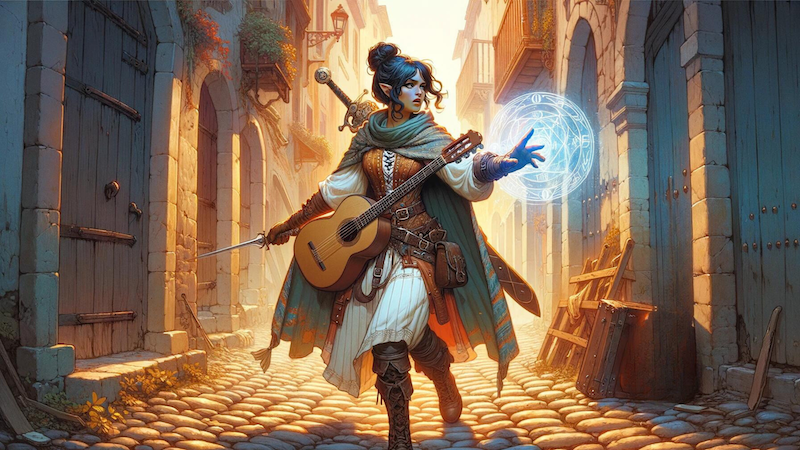
Understanding the Bard Archetype
- bard names The bard, a figure steeped in history and culture, has played a pivotal role in storytelling, music, and folklore across diverse societies. Traditionally, bards served as the oral historians and entertainers of their communities, weaving tales that preserved the legacies of heroes, legends, and significant events. Their capacity to connect emotionally with their audience distinguished them, as they utilized various artistic forms, including poetry, song, and dramatic performance, to convey their messages. This made them not merely entertainers but also custodians of culture, enriching the societal fabric through their narratives.
In modern literature and gaming, the bard archetype has evolved yet remains defined by certain characteristics. Bards are typically portrayed as charismatic and inventive individuals, gifted with an ability to inspire others and influence situations through their art. They embody creativity and quick thinking, utilizing music and other forms of expression to overcome challenges or charm those around them. This allure is often reflected in their diverse abilities, often including skills in persuasion, deception, and magical interpretations of their art, allowing them to navigate complex landscapes.
Given the significant role bards play, the creation of an engaging name becomes vital. A compelling moniker encapsulates the essence of a bard’s persona and mirrors their creativity and charisma. In light of their historical and contemporary relevance, understanding the bard archetype is crucial for those seeking to craft meaningful names that resonate with the legacy of this enchanting figure.
Elements of a Memorable Bard Name
Creating a memorable bard name requires a thoughtful approach that intertwines various elements, ensuring that the name reflects the unique traits and skills of the character. One of the primary factors to consider is the phonetic quality of the name. Names that possess melodic rhythms or musical inflections can evoke the artistry associated with bards. For instance, names that feature soft consonants and flowing vowels often create a pleasing soundscape, reminiscent of harmonious melodies. Such phonetics not only contribute to the name’s appeal but also establish a connection to the bard’s musical talents.
Another significant aspect involves the linguistic roots of the name. Drawing inspiration from different languages or cultures can enrich the bard’s identity and backstory. Names derived from Celtic, Latin, or even invented languages can resonate with a bard’s heritage, linking them intricately to their narrative. Additionally, using alliteration or rhyme within the name can further accentuate its musicality, making it more memorable to both the character and the audience.
Moreover, a bard’s personality traits and backstory can heavily influence name choices. A character known for their charm might have a name that sounds inviting and warm, while a more enigmatic bard may possess a name that suggests mystery or intrigue. Physical traits are also valuable in this process; names reflecting attributes such as hair color or uniqueness can add an engaging layer of depth. When creating bard names, one should aim for authenticity, ensuring that each name resonates with the essence of the character and their artistic abilities. This thoughtful crafting elevates a mere title into a reflection of the bard’s vibrant existence within the storytelling realm.

Inspiring Bard Name Examples
Choosing the perfect name for a bard is not solely about aesthetics; it encompasses the character’s essence, personality traits, and the narrative they bring to life. Below is a curated list of evocative bard names, organized by thematic styles that will encourage creativity in your character creation process.
Whimsical Names
Whimsical bard names often evoke a sense of playfulness and charm. For example, Fiddlesticks Tanglewood is a name that suggests a character with playful energy, likely to captivate audiences with comical tales and lively tunes. Another option, Pip Thistledown, conveys a light-hearted spirit, perfect for a bard who specializes in joyful songs and amusing anecdotes. These names speak to the carefree nature many bards exhibit during their performances.
Heroic Names
Heroic bard names carry a gravitas that suggests courage and valor. Take the name Elara Brightsong, which hints at a character who not only sings of heroic deeds but also partakes in them. Similarly, Thorin Steelstrum portrays a strong, influential character likely to inspire actions against evil through his passionate ballads. These names evoke admiration and respect, reflecting a bard’s role as a storyteller of noble stories.
Ominous Names
For those seeking to craft a darker or more mysterious bard, consider names like Sariel Nightshade. This name suggests a character with a shadowy background, possibly spinning tales of melancholy and intrigue. Alternatively, Raven Darkwhisper encapsulates an enigmatic presence, hinting at tales of loss or betrayal wrought with deep emotional resonance. Such names allow the bard character to weave profound relationships with their audience through poignant storytelling.
Utilizing these examples, aspiring creators can draw inspiration and develop their unique bard names, ensuring that the moniker encapsulates the character’s narrative, personality, and thematic resonance.
Tips for Creating Your Own Bard Names
Creating a unique and fitting name for your bard is an essential step in developing your character’s persona as a musical storyteller. Here are some practical tips to generate a memorable bard name that resonates with the essence of your character.
One effective approach is to utilize name generators, which can offer a wealth of inspiration. Many online tools are available that allow you to input keywords or creative prompts, generating an array of names that can spark ideas. These generators can help broaden your search and provide unexpected combinations that may appeal to you.
bard names Another method involves drawing from historical figures or legendary musicians. Researching names of famous poets, singers, or bards from various cultures can shed light on naming conventions and characteristics pertinent to your bard’s background. This research can infuse your character’s name with depth and historical significance, which contributes to their overall narrative.
Playing with word combinations is also a fruitful strategy. Consider merging distinct elements such as adjectives that reflect your bard’s personality with nouns that evoke a sense of musicality or storytelling. For instance, a name like “Lyric Shadow” may imply a character who is both mysterious and melodic. Wordplay can lead to innovative and engaging names that captivate audiences.
When crafting a bard’s name, it’s crucial to incorporate aspects of their history or personality. Think about their experiences, values, and aspirations—they can guide you in selecting a name that resonates deeply. A name that echoes the bard’s journey or the themes of their tales can enhance the narrative coherence.
Lastly, always test the name in context. Say it aloud and consider how it feels when linked to your bard’s story. The sound and resonance of a name can significantly impact the character’s presence within a narrative. Embrace creativity and experimentation throughout this process, as the perfect bard name is waiting to be discovered.



